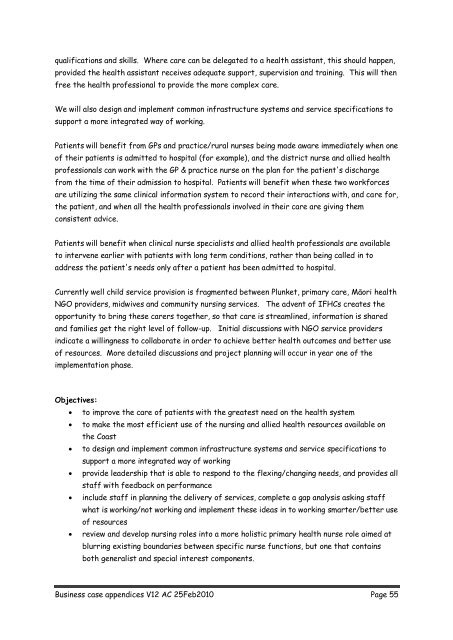Better Sooner More Convenient Primary Care - New Zealand Doctor
Better Sooner More Convenient Primary Care - New Zealand Doctor
Better Sooner More Convenient Primary Care - New Zealand Doctor
Create successful ePaper yourself
Turn your PDF publications into a flip-book with our unique Google optimized e-Paper software.
qualifications and skills. Where care can be delegated to a health assistant, this should happen,<br />
provided the health assistant receives adequate support, supervision and training. This will then<br />
free the health professional to provide the more complex care.<br />
We will also design and implement common infrastructure systems and service specifications to<br />
support a more integrated way of working.<br />
Patients will benefit from GPs and practice/rural nurses being made aware immediately when one<br />
of their patients is admitted to hospital (for example), and the district nurse and allied health<br />
professionals can work with the GP & practice nurse on the plan for the patient's discharge<br />
from the time of their admission to hospital. Patients will benefit when these two workforces<br />
are utilizing the same clinical information system to record their interactions with, and care for,<br />
the patient, and when all the health professionals involved in their care are giving them<br />
consistent advice.<br />
Patients will benefit when clinical nurse specialists and allied health professionals are available<br />
to intervene earlier with patients with long term conditions, rather than being called in to<br />
address the patient's needs only after a patient has been admitted to hospital.<br />
Currently well child service provision is fragmented between Plunket, primary care, Māori health<br />
NGO providers, midwives and community nursing services. The advent of IFHCs creates the<br />
opportunity to bring these carers together, so that care is streamlined, information is shared<br />
and families get the right level of follow-up. Initial discussions with NGO service providers<br />
indicate a willingness to collaborate in order to achieve better health outcomes and better use<br />
of resources. <strong>More</strong> detailed discussions and project planning will occur in year one of the<br />
implementation phase.<br />
Objectives:<br />
to improve the care of patients with the greatest need on the health system<br />
to make the most efficient use of the nursing and allied health resources available on<br />
the Coast<br />
to design and implement common infrastructure systems and service specifications to<br />
support a more integrated way of working<br />
provide leadership that is able to respond to the flexing/changing needs, and provides all<br />
staff with feedback on performance<br />
include staff in planning the delivery of services, complete a gap analysis asking staff<br />
what is working/not working and implement these ideas in to working smarter/better use<br />
of resources<br />
review and develop nursing roles into a more holistic primary health nurse role aimed at<br />
blurring existing boundaries between specific nurse functions, but one that contains<br />
both generalist and special interest components.<br />
Business case appendices V12 AC 25Feb2010 Page 55

















